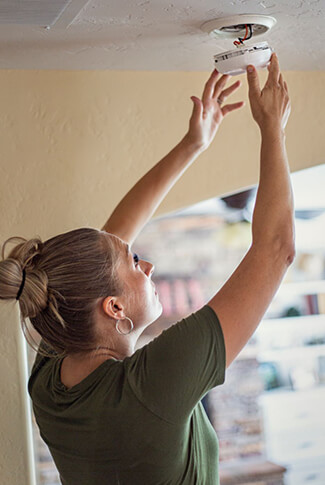How to prevent house fires

Avoid distractions and risky behaviours and make sure your electrical system is up to scratch. Most house fires are preventable. Here are some important reminders.
Kitchen and cooking fires
Most house fires start in the kitchen. It might seem minor, but it’s important to choose the right burner for your pan. Overfilled pans tend to overflow, and the contents can burn on the element if it extends past the bottom of the pan.
Like deep frying? Using a pot full of hot oil is never a good idea. Get a deep fryer with a thermostat to regulate the temperature, or, for even safer and healthier meals, try an air fryer or the oven.
Never turn your back on a hot stove, even for just a few seconds. Always turn off your appliances immediately after use and promptly clean up any oil or food that spills on the stove or in the oven.
Tips: Keep a metal lid handy for smothering fires. You should always have a fire extinguisher at the ready. And make sure to replace it or have it recharged periodically. Be careful and avoid overestimating your abilities. Call 911 if you need help. Proper maintenance of your range hood
will keep it working like a charm.
Beware of living room and basement fireplaces
When it’s cold outside there’s nothing better than cozying up next to a warm fire. Don’t forget to clean your fireplace or woodstove after each use by removing any leftover ash and disposing of it safely in a metal container outside your house. You should also have your chimney swept every fall. A CAA-Quebec approved supplier will do the job right.
Watch out for dryer lint
Maintain your appliances properly. Have your dryer vent pipe inspected and cleaned by a specialized company every year, and keep the outside exhaust free of debris and snow in winter. Is your laundry warmer than usual? The pipe is probably blocked. Don’t let lint build up in the filter. Clean it after each use and don’t run your dryer when you’re not home.
Good to know!
Rubberized and stuffed items like bathmats and pillows don’t go in the dryer. Use a clothes rack or hang them out on the line in the summer. The same goes for clothes or fabric soaked with paint, solvent, or other substances. Don’t put them in the laundry without air drying them first. Better yet, get a cleaning company to handle it for you.
And please don’t use baseboard heaters or portable electric heaters to dry your toques, mittens, or socks. There are appliances designed specifically for the task.
Backyard fire hazards
Every year, forest fires destroy hectares upon hectares of forest and endanger people’s homes and lives. Unfortunately, many forest fires are started by homeowners who have open fires in their backyards. If a SOPFEU ban on open fires is in force in your area, it also applies to your backyard. But remember, you can still use outdoor fireplaces with spark arrestors. Just don’t have fires when there are high winds. The same goes for decorative torches, citronella candles (which should always be placed in non-flammable lanterns or containers), and so on.
Good to know:
Flowerpots aren’t ashtrays! Potting soil often contains flammable materials. If you or your guests smoke, use a covered ashtray intended for outdoor use.
BBQs are for outdoors
If you’re planning to throw some steaks on the grill and it starts to rain, the last thing you should do is bring the BBQ into your garage. You could cause a fire or suffer acute propane poisoning. It’s OK to put your BBQ under a gazebo or a covered patio, as long as there is plenty of air circulation.
Hazardous products and risk of explosion
Many fires escalate due to a series of small explosions caused by hazardous materials. The usual suspects include paint, solvents, gas, lighter fluid, and propane tanks. But don’t forget household items like fondue fuel, nail polish, rubbing alcohol, and hairspray. Store them in a safe place, far away from heat sources (outdoors for gas and propane), and dispose of them properly.
Make sure to keep matches and lighters out of reach of children. Unfortunately, too many fires are still started by curious children.
Smoking is dangerous
Everyone knows that cigarettes, cigars, and pipes should never be left unattended. But it bears repeating that smoking while lying down on a bed or couch is also dangerous. Get safe ashtrays. Even if you don’t smoke, it’s a good idea to have at least one covered ashtray for your guests.
Electrical fires
Are you a total techie? Don’t overload your electrical outlets. At the very least you should make sure you have the proper equipment, like surge-protected power bars. Repair any broken or defective wires, especially when you can see through the cable jacket. And pay special attention to indoor and outdoor holiday decorations. If your house is over 15 years old, it’s a good idea to have a professional inspect your electrical system to make sure everything is working correctly.
Get the right fire prevention accessories

It can’t be said enough: smoke detectors save lives, as long as they’re in working order. Check the batteries at least twice per year (do it when the clocks change). You should install at least one detector on each floor, including near the bedrooms, the kitchen, and ideally the electrical panel. Have a garage? Get a carbon monoxide detector. And don’t forget fire extinguishers.
Make sure you’re insured if something goes wrong

Home insurance doesn’t prevent house fires, but it does protect you in the event of a loss. Make sure you have enough coverage to rebuild your home and review your policy if you acquire a valuable item, your habits change, other people move in, etc. Unfortunately, too many people still neglect to insure themselves properly, especially renters.
Other types of insurance can also protect you against fire. See who pays for what in the event of a blaze. The Insurance Bureau of Canada’s website also has tons of prevention tips, including for house fires.

Protect your home
See how CAA-Quebec Home Insurance can meet all your needs.